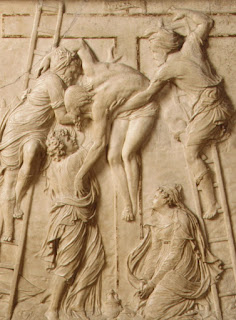Woman, why are weeping? Who are you looking for? The one you
seek is in your possession, and you do not know it? You have the true, the
eternal joy, and yet you weep? It is within your inmost being, and you look for
it without? You stand outside, weeping at the tomb? Your heart is my tomb. I am
not dead there, but I take my rest in your heart, living forever. Your heart is
my garden. You were right to suppose that I was the gardener. I am the new
Adam. I till and care for my paradise. Your tears, your love and your longing
are all my work. In your inmost being you possess me, although you do not know
it, and so you look for me without. Outwardly, therefore, I will appear to you,
and make you return to yourself, that in your inmost being you may find the one
whom you seek outside.
Duccio di Buoninsegna, Mary Magdalen with the Risen Christ, tempera on panel, 1308-11, Lines by an anonymous monk of the 13th century, Meditatio de Passione et Resurrectione Christi, 38; PL
184, 766.
















